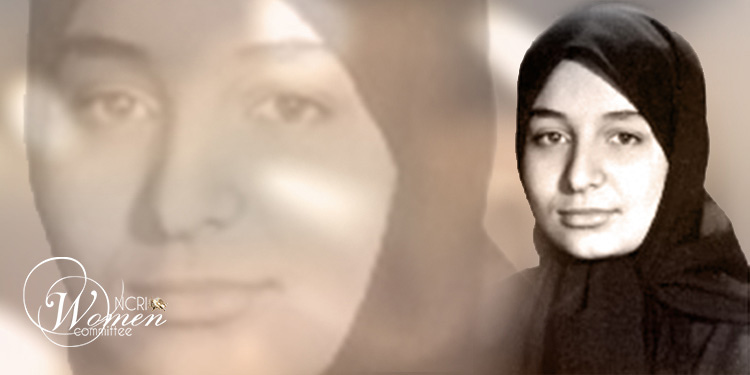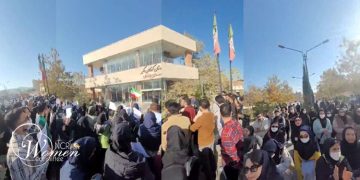From the memoir “The Last Laughter of Leila” by Mehri Hajinejad– Part Five
In this part of Mehri Hajinejad’s prison memoir “The Last Laughter of Leila,” the author, then a teenage student, recounts the story of a fellow young fighter, Simin Hozhabr, a girl whose courage and unwavering faith sustained her through the brutality of prison and torture.
The Defiant Lioness of Evin
I met Simin Hozhabr[1] in early September 1981 in the infirmary ward of Evin Prison. We already knew each other. For us, and for anyone who learned about her case and interrogations, Simin was both a role model and a hero.
Over all the years I saw her, I remember Simin Hozhabr as an energetic, cheerful girl with a radiant smile. She was a student from central Tehran, if I recall correctly, at Hashtroudi High School.
Despite coming from a relatively well-off family, Simin lived simply. In fact, when I first met her, I assumed she was from the poorer southern districts of Tehran.
I still remember those unforgettable days, when we campaigned for Massoud (Rajavi’s) presidential candidacy, the tense days leading up to June 20, 1981, and the instant demonstrations we staged. In all those moments, Simin stood out, lively, fearless, and steadfast, one of the most spirited young PMOI supporters of that phase.
When I saw her again in Evin, I asked, “How are things? How were you arrested?”
With her usual warmth and calm, she told me about the responsibilities she had shared in Tehran with her teammate Fereshteh Seyfi, then added, “We were arrested in August. We’ve been here since then… and I think we’ll be leaving soon.”
“Leaving? What do you mean?” I asked.
She smiled. “You don’t know where? From the very first day, I told the interrogator not to waste his time; he’ll get nothing from me. Now, I’m ready to go.”
Then, in her rich, lively voice, she began singing the famous Lori song, Dayah Dayah, Vaqt-e Jangah (“It’s time to fight.”)
Almost every day, Simin Hozhabr was taken for interrogation, and each time she returned with bruised and swollen legs. Her first words were always, “That idiot of an interrogator still thinks he can break me.”
On the evening of August 30, 1981, they called for Simin again. I couldn’t stop thinking that she might be executed that night, as revenge for the deaths of Rajai and Bahonar. Until she came back, I was restless.
Late that night, Simin returned, battered and torn. She said they had given her until the next day to decide: if she refused to cooperate, she’d be executed.
That night, by candlelight borrowed from some ordinary inmates, we gathered around her. We sang poems and songs together, farewell, thinking it might be Simin’s last night with us.
Each time Simin Hozhabr was taken for questioning, I wondered what the regime wanted so desperately from her. It wasn’t common in those days for anyone to be interrogated more than twice, those identified as PMOI sympathizers were usually executed after two sessions.
One day, I asked Fereshteh, Simin’s co-defendant, “What’s really going on?”
Fereshteh said, “They beat her and demand information about her brothers. Simin shouts, ‘I know, but I won’t tell!’ That enrages the interrogator even more. He beats her harder, screaming, ‘Then at least don’t say you know and won’t tell, just say you don’t know!’ But Simin answers, ‘You backward fool! I do know, but I won’t say. You’ll never get what I know.’”
Fereshteh continued, “If it were only about our own cases, it’d be over by now. Anyone proven to have ties with the Organization gets executed right away. But they want Simin’s brothers. They want her to give them up.”
In November, when prisoners were transferred, I was separated from Simin and never saw her again.
In early December 1981, Mahshid returned from interrogation and said, “Simin will be executed tonight. They brought her in today, her interrogator was clearly at the end of his rope. He told her, ‘I can’t do anything with you anymore. I have to request your execution. I’ve tried for three months and failed. I don’t know what you’re made of, or where you get such endurance.’”
That night, the brave PMOI combatant Simin Hozhabr walked to the firing squad, proud, unbroken, and fearless.
Two things about her will stay with me forever:
Her unshakable strength, shouting at her torturer, “You will achieve nothing!” and her ever-smiling face, her head held high, even as she faced death.
[1] Simin Hozhabr – A beautiful, dark-complexioned girl who looked about 16 or 17. Her voice was warm and melodious. Her family was from Lorestan, though she herself had grown up in Tehran. Simin seemed to know no fear. She was taken for interrogation daily, flogged each time,“her daily ration,” as the guards called it.
Yet the moment she stepped back into the ward, she would start singing Lori folk songs, smiling as if nothing had happened. Once, I told her, “Simin, the way you come back laughing and singing only makes them beat you more. Stay quiet for a while!” She burst out laughing: “Either I’ll break them, or they’ll break me but they’ve guessed wrong. I’ll break them!”
The torturers kept her under severe torture for a month before her execution, but even there, she roared like a lion until the end. Her name remains among the PMOI’s heroic martyrs. (From the book The Price of Being Human, prison memoirs of Azam Haj Heidari.)
























